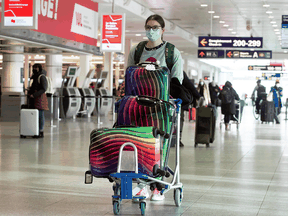The federal government also requires travellers to mask and track close contacts for 14 days after arriving in Canada
Anna Mehler Paperny
Publishing date:Apr 19, 2022 •

Passengers at the nearly empty departure level of Trudeau International Airport in Montreal on December 17, 2021.
PHOTO BY PIERRE OBENDRAUF/POSTMEDIA/FILE
TORONTO — Canada’s federal government said on Tuesday it has no plans to stop requiring masks on planes after a Florida judge struck down a U.S. version of the law.
“We are taking a layered approach to keeping travellers safe, and masks remain an incredibly useful tool in our arsenal against COVID-19,” a spokesperson for Canada’s Transport Minister wrote in an email.
The spokesperson confirmed masks will be required on Canadian airlines and on flights that depart from or arrive in Canada. The federal government also requires travellers to wear masks and track close contacts for 14 days after arriving in Canada.
On Monday, U.S. District Judge Kathryn Kimball Mizelle struck down the U.S. mandate, which required masks on airplanes, trains and in taxis, among other locations, saying the U.S. Centers for Disease Control and Prevention had exceeded its authority.
In Canada, the landscape is different. Surveys have shown masking to be widely popular. More than challenges to mask mandates, there is vocal opposition and legal challenges to lifting them.
Last week an Ottawa school board introduced its own mask mandate after the province dropped its requirement. In a letter to parents, the board said students will not be suspended or expelled for non-compliance but their parents may be called.
The Canadian Civil Liberties Association did not consider challenging Canada’s mask mandate, its fundamental freedoms director Cara Zwibel said.
“It’s hard to know, really, what right is kind of being violated by a mask mandate” assuming medical exemptions were permitted, she said.
It’s “what the court would probably characterize as ‘de minimis’ — it’s a minor sort of incursion.”
Zwibel said travel is one of the most justifiable places to impose these kinds of measures.
(Reporting by Anna Mehler Paperny; Editing by Lincoln Feast.)
No comments:
Post a Comment